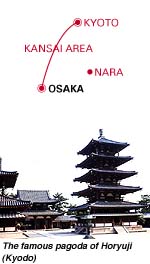
 |
 |

-
Kansai: The Cradle of Japanese Civilization The cities of Kyoto, Nara, and Kobe are some of the most popular places in Japan for tourists from all over the world. Along with Osaka, these culturally and historically important cities are located in the Kansai region. Kansai is quite different from the Kanto region, where Tokyo and Yokohama are found: People speak with a different accent and enjoy different types of food than they do in the capital. Japanese in Kansai and Kanto enjoy a friendly rivalry with each other, with each claiming to be closer to the "real" Japan.
Kyoto was the ancient capital of Japan and home of the imperial court for over 1,000 years beginning in 794. Its cultural assets, which attract tourists from all over the world, include Kyoto Imperial Palace and Nijo Castle as well as many beautiful temples. The city is the national center for crafts, such as fabrics, pottery, lacquerware, dolls, and fans, and arts like tea ceremony and flower arrangement. Various traditional performing arts--noh, kyogen, and kabuki--first became popular in Kyoto.
Nara is also well known for its Buddhist relics. It was the capital of Japan from 710 to 784, when it was called Heijokyo. The city was designed to look just like Chang'an, the Chinese capital at the time, and had a population of nearly 200,000--huge for that era. Nara's Horyuji, built in the early 7th century, is believed to be Japan's oldest surviving temple. It's the oldest wooden building in the world. Todaiji, built in the 8th century, is a temple known for its giant statue of Buddha. These sites are popular among visitors to this day.
The city of Kobe, about 30 kilometers west of Osaka, has been a center for foreign trade for more than 100 years. Today, it is known for its international atmosphere: The town is filled with exotic restaurants and places of worship for all the world's religions. Kobe was hit by the January 1995 Great Hanshin Earthquake, which killed nearly 6,000 people. But the region has made an impressive recovery, and is again attracting many tourists.

RETURN TO
QUESTION
LOOK AT ANSWER